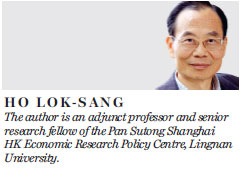Time for more public spending
Updated: 2015-12-01 08:10
By Ho Lok-Sang(HK Edition)
|
|||||||
Ho Lok-sang makes a strong case that the Hong Kong government should be spending much more than it currently does in order to improve people's livelihoods
Recently I completed a research project about optimal government spending. Using World Value Survey data for Wave 5 and Wave 6 (2004-2009 and 2010-2014, respectively) my co-author Ng Yew-kwang and I worked out two alternative approaches for estimating optimal government spending expressed as a percentage of GDP. The two approaches produce similar results, lending credibility to the estimates. This is not the place to explain the methodology, but the main results are quite interesting. They are certainly pertinent to Hong Kong, especially in view of the ongoing consultation on the Policy Address.
We have confirmed the conjecture that there is no single optimal government spending across different economies. Depending on the stage of development, the quality of public governance and demographics, optimal spending will vary from economy to economy. Perhaps the biggest discovery is that optimal public spending in Hong Kong should be almost double what it is currently - about 39 percent of GDP!
Hong Kong does not have to undertake defense spending - as the central government does this for us. So excluding defense spending, Hong Kong's total optimal public spending perhaps should be around 36 percent of the GDP. This is based on the assumption that defense spending for the city, if we had to do it, would be similar to Singapore, where some 3.2 percent of GDP is spent on national defense. This compares with the rule of thumb of public spending being set at about 20 percent of the GDP, as mentioned many times by our financial secretaries from colonial times until now.
If we look into particular areas of spending, we find that optimal health spending in the public sector should be about 3.1 percent of GDP, while optimal education spending should be about 5.1 percent. The actual health spending is just around 2.6 percent and education spending is 4.3 percent. Although the absolute difference between the figures 3.1 and 2.6, or between 5.1 and 4.3, does not seem to be very big, the results indicate that public healthcare spending should be increased about 23 percent, while education spending should be increased about 18.6 percent.
Interestingly, our results indicate that optimal government spending is only around 18 percent of GDP for a class of economies rated as having a low quality of public governance. Since Hong Kong's public governance is considered to be very good, according to World Bank indicators, we should be spending much more than we currently do. This is if we are serious about improving the well-being of people in Hong Kong.
Increasing public spending without creating deficits requires higher taxes. Otherwise the fiscal situation will become unsustainable. Given that there is a requirement in the Basic Law that Hong Kong should maintain its low tax system, it will require wisdom to achieve higher levels of public spending without contravening Basic Law provisions.
Article 108 in the Basic Law says:" The Hong Kong Special Administrative Region shall, taking the low tax policy previously pursued in Hong Kong as reference, enact laws on its own concerning types of taxes, tax rates, tax reductions, allowances and exemptions, and other matters of taxation."
I believe there is room for different interpretations of what "low tax policy" means. I recommend lowering or even eliminating profits tax altogether. Profit retained in a company is called retained earnings and supports investment or serves as working capital: machinery/equipment, construction, research and development, or as a buffer against hard times and risks. As such, it serves useful social goals and should not be taxed - at least not at a high level. On the other hand, distributed profit becomes personal income. I would recommend treating capital gains as well as dividends received as taxable personal income. By widening tax bands so working class people can enjoy lower tax burdens, we can raise the top marginal tax rates significantly to finance higher public spending. We can introduce exemption levels for capital gains and dividends, so small investors need not find paying tax burdensome. On the other hand, some individuals are receiving hundreds of millions of dollars in tax-free dividend payments each year. They should pay more tax. This will not undermine the quality of their lifestyles or the spirit of the "low tax policy".
Some people argue that higher marginal tax rates on the super rich could lead to them changing their place of residency. The case of actor Gerard Depardieu, who took up Russian citizenship to avoid French tax, has been widely reported. However, I would not worry too much about such cases. The attraction of Hong Kong as a safe city where personal freedoms can be enjoyed is overriding. More important, with tax brackets widened, the super rich will still retain superlative incomes. I cannot imagine many super-rich Hong Kong people opting to move to Russia to avoid paying Hong Kong taxes.
Of course, just raising spending on healthcare and education is not enough. As noted before, more spending can only be acceptable under good governance, which ensures money is well spent. The director of audit has pointed out some mistakes. We need to ensure that these and other blunders are minimized. Only then can we improve the lot of Hong Kong people.

(HK Edition 12/01/2015 page9)